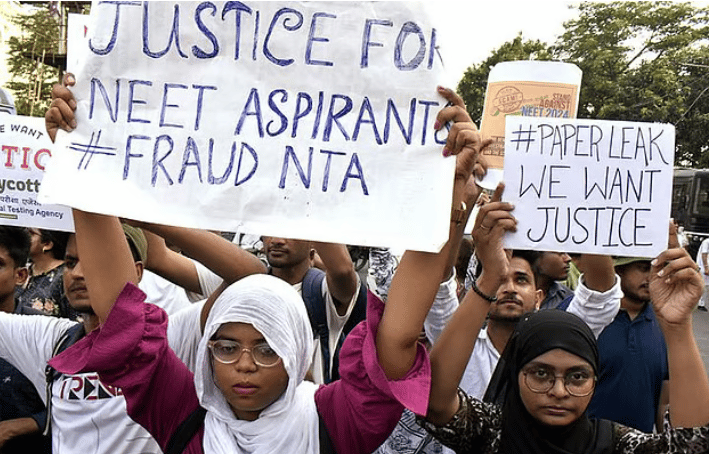Do You Know Why the NEET Controversy Is Shaking India’s Education System
The NEET controversy has sparked nationwide debates, raising questions about fairness, transparency, and equal opportunity in India’s education system. From allegations of paper leaks to the challenges faced by rural and underprivileged students, explore how this exam impacts millions of aspirants, parents, and the future of medical education in India.
KNOWLEDGE & EDUCATION
Do You Know Team
7/30/20253 min read


In recent years, the National Eligibility cum Entrance Test (NEET) has become one of the most debated topics in India’s education system. While the exam was introduced to create uniformity in medical admissions across the country, it has sparked widespread controversy. From allegations of unfair practices to concerns about regional imbalances, the NEET debate highlights the challenges of balancing equality and excellence in education. Let’s explore the reasons why NEET is at the center of India’s educational storm.
1. The Purpose Behind NEET
NEET was introduced with the goal of streamlining the medical admission process in India. Before NEET, states and private institutions conducted their own entrance exams. This led to confusion, inconsistencies, and allegations of corruption. By creating a single national test, policymakers hoped to ensure transparency, reduce malpractices, and make the admission process fairer.
2. The Allegations of Unfair Practices
Despite its objectives, NEET has faced allegations of paper leaks, cheating, and irregularities in exam conduct. These issues undermine the very purpose of the test and erode trust in the system. In several cases, protests by students and parents have erupted, demanding accountability and stricter measures.
3. The Language Barrier
One of the most prominent criticisms of NEET is the language divide. While the exam is conducted in multiple languages, students from rural areas and regional boards often feel disadvantaged compared to those who study in English-medium institutions. This raises concerns about equal opportunity and inclusivity in a country as linguistically diverse as India.
4. Urban-Rural Divide in Access
NEET has highlighted the stark difference in access to resources between urban and rural students. Urban students often have better coaching facilities, internet access, and exposure to competitive exams. Rural students, on the other hand, face challenges in terms of quality education and financial support, making it difficult to compete on equal footing.
5. The Impact on State Autonomy
Before NEET, states had more control over medical admissions. With NEET, states lost some of this autonomy, which has sparked political debates. Critics argue that a one-size-fits-all approach doesn’t account for regional differences in curricula, infrastructure, and socio-economic backgrounds.
6. Mental Health and Pressure on Students
The intense competition of NEET has increased stress levels among students. The pressure to succeed in a single, high-stakes exam can lead to anxiety, burnout, and even tragic cases of student suicides. Mental health advocates are calling for a more balanced system that evaluates students holistically rather than through a single test.
7. Economic Inequality and Coaching Industry
The rise of the NEET coaching industry has further exposed economic inequality. Families with higher incomes can afford top coaching institutes, while poorer students struggle to pay high fees. This creates an uneven playing field and reinforces the cycle of inequality.
8. Legal Battles and Court Interventions
NEET has been challenged multiple times in the courts. From its constitutionality to fairness, the judiciary has played a significant role in shaping its implementation. While the Supreme Court has upheld NEET, legal disputes continue to emerge, reflecting the deep-rooted disagreements.
9. Protests and Public Outcry
The NEET controversy has sparked widespread protests by students, parents, and political groups. The recurring nature of these protests shows the depth of dissatisfaction and the urgent need for reforms in how the exam is conducted and perceived.
10. The Way Forward: Reform or Replace?
The NEET debate has reached a critical point. Some argue that the exam should be reformed with safeguards for inclusivity, fairness, and accessibility. Others believe India should explore alternative methods of admission that consider a student’s overall academic performance rather than relying solely on one exam.
FAQ
Q1: Why was NEET introduced in the first place?
NEET was introduced to unify medical entrance exams across India, reduce corruption, and create a transparent and fair admission process.
Q2: Why do students and parents protest against NEET?
Protests often arise due to issues like paper leaks, language barriers, economic inequality, and the mental pressure caused by the exam.
Q3: Does NEET favor urban students more than rural students?
Yes, urban students often have access to better coaching, resources, and exposure, while rural students face significant disadvantages.
Q4: Is there a chance NEET will be replaced?
At present, NEET is upheld by the Supreme Court, but growing debates and protests may push policymakers to consider reforms or alternatives in the future.
Conclusion
The NEET controversy is more than just a debate about an exam; it reflects the larger challenges of India’s education system. Balancing equality, accessibility, and excellence is no easy task, but the ongoing debate around NEET shows the urgent need for reforms. Whether through reforms or new approaches, the future of India’s medical education system must prioritize fairness, inclusivity, and the well-being of students.
#NEETControversy #IndianEducation #MedicalAdmissions #DoYouKnow #EducationReforms
Knowledge
Empowering minds with reliable educational content daily.
Newsletter Signup
© 2025 DoYouKnow. All rights reserved.
Stay Ahead of the Trends – Join Our Newsletter
